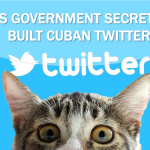Cuba Denounces 'Secret Twitter' As Proof of US Cyber-War

Revelations of a secret US government programme to set up a cellphone-based social network in Cuba are being trumpeted in the island's official media as proof of Havana's repeated allegations that Washington is waging a "cyber-war" to try to stir up unrest.
"ZunZuneo joins an extensive list of secret anti-Cuban operations" including the failed Bay of Pigs invasion of 1961 and plots to assassinate Fidel Castro, state news agency Prensa Latina said.
The findings of an Associated Press investigation, published on Thursday, featured prominently on multiple Cuban state TV newscasts and occupied a full page in the Communist Party newspaper Granma on Friday. They also were to be the focus of the nightly two-hour news analysis show "Mesa Redonda”, or "Roundtable".
Prensa Latina recalled a 1 January speech in which President Raúl Castro warned of "attempts to subtly introduce platforms for neoliberal thought and for the restoration of neocolonial capitalism”.
"Castro's denunciations of the US government's destabilising attempts against Cuba were corroborated by today's revelation of a plan to push Cuban youth toward the counterrevolution, with the participation of a US agency," Prensa Latina said.
US officials defended the program as being in line with the mission of the US Agency for International Development (USAID), which oversaw it. They said it did not amount to a "covert" operation, although they said the government takes steps to maintain discretion when working in "non-permissive environments" such as Cuba.
Documents obtained by the AP showed that the network, dubbed ZunZuneo after the Cuban word for hummingbird, operated from 2009 until it vanished in 2012. Some 40,000 island cellphone users signed up and used ZunZuneo to receive and send text messages, mostly innocuous jokes or snippets of international, sports and entertainment news.
However the AP revealed that the network, which was built using secret shell companies and financed through a foreign bank, sought to first build an audience of mostly young people and then nudge them toward dissent.
In a statement late Thursday, Josefina Vidal, director of US affairs at Cuba's foreign ministry, demanded that Washington halt "its illegal and clandestine actions against Cuba". She said the ZunZuneo case "shows once again that the United States government has not renounced its plans of subversion against Cuba".
Cuba has one of the lowest internet penetration rates in the world, though the country has taken small steps to expand access. Last year it opened about 200 cyber-cafés around the country, though at $4.50 an hour many Cubans are effectively priced out. The government also controls nearly all traditional media.
Cellphone use is increasingly common among the island's population of 11 million. Official statistics say there were about 1.8 million active Cuban mobile accounts in 2012, compared with 400,000 in 2007.
On the streets of Havana, some echoed their government's complaints about US interference and ZunZuneo.
"Coming from them [the United States], nothing can surprise us anymore," said 25-year-old Claudia Garcia.
